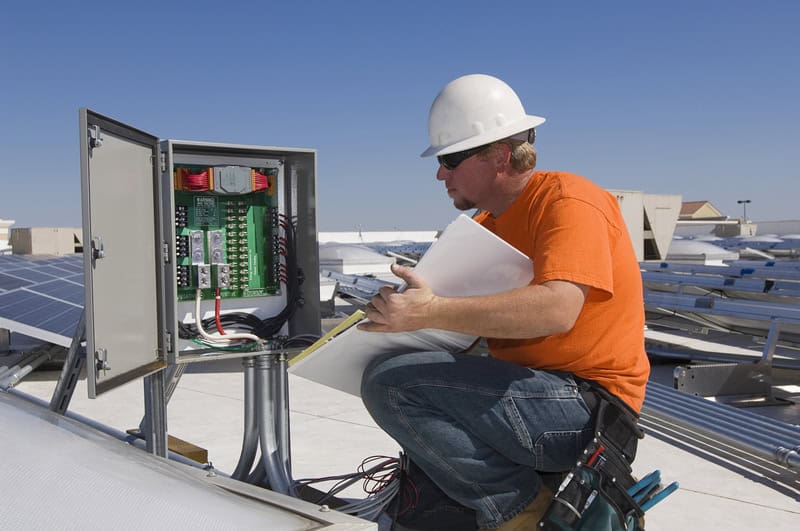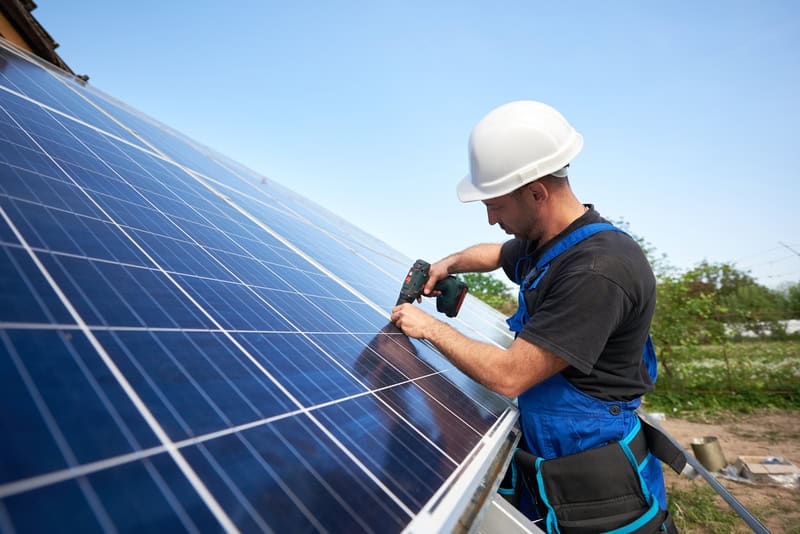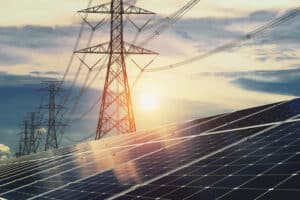
Table of Contents
Why Electrical Contracting is Crucial for Solar Projects
In 2025, solar energy systems are more powerful, smarter, and more integrated than ever. However, without expert electrical work, even the best-designed systems can underperform or become safety hazards. Electrical contracting for solar companies is not a secondary consideration—it’s a cornerstone of successful solar project delivery.
At JMS Energy, precision and safety in electrical installations ensure our clients receive solar systems that perform optimally and comply with all regulatory requirements.
Responsibilities of Electrical Contractors
When it comes to solar projects, electrical contractors handle:
- DC and AC wiring for PV systems
- Installation of inverters, disconnects, and panels
- Grounding and bonding
- Voltage calculations and load balancing
- Interfacing with utility grids
Their role is vital for the project’s compliance, performance, and longevity. That’s why mastering electrical contracting for solar companies is essential for firms aiming to scale responsibly and profitably.
Integrating Electrical Design from Day One
A common mistake is treating electrical work as an afterthought. Instead, top-performing solar firms integrate electrical design in the early planning stages:
- Electrical blueprints align with structural and mechanical layouts
- Early contractor involvement prevents redesigns and delays
- Contractors provide real-world insight that improves installability
This coordination minimizes risk and enhances workflow.
Compliance with NEC and Local Codes
The National Electrical Code (NEC) is the baseline for safety. However, local AHJs (Authorities Having Jurisdiction) may have specific amendments. Best practices include:
- Staying current with NEC revisions
- Understanding region-specific interpretations
- Incorporating code requirements into every drawing and checklist
Non-compliance can result in costly rework or project shutdowns.
Proper Wire Management and Labeling
Clean, well-labeled wiring isn’t just for aesthetics—it:
- Prevents shorts and cross-connections
- Simplifies troubleshooting
- Meets inspection standards
Contractors should use UV-resistant zip ties, weather-rated labels, and consistent color coding throughout the system.
Efficient Grounding and Bonding Techniques
A critical safety measure, grounding ensures:
- Electrical surges are safely dissipated
- Fire risk is minimized
- Personal protection from electric shock
All grounding must follow NEC 690.47 standards, using proper bonding lugs, lay-in connectors, and exothermic welds where applicable.
Use of Quality Conduits and Connectors
Contractors should prioritize:
- UV- and weather-rated conduit for outdoor use
- Proper bend radii to reduce wire stress
- Secure fittings to prevent moisture intrusion
In electrical contracting for solar companies, materials impact system life and performance.
Accurate System Sizing and Load Calculations
Proper system sizing avoids:
- Overloading inverters and service panels
- Undersizing that leaves capacity unused
- Failures during peak generation or consumption
Contractors should calculate both current and future electrical loads using NEC Articles 220 and 705.
Safe and Clean Panel Wiring
Inside the service panel:
- Wires should be neatly routed and labeled
- Unused knockouts should be sealed
- No over-filling or double-lugging breakers
JMS Energy emphasizes these details in every project, making electrical contracting for solar companies a clean, reliable process.
Effective Communication with Project Teams
Electrical work impacts civil, structural, and mechanical teams. Contractors must:
- Participate in pre-construction meetings
- Flag potential conflicts early
- Maintain transparent timelines and status updates
This synergy ensures timely and efficient project delivery.
Routine Testing and Commissioning
Testing confirms the system’s safety and functionality:
- Insulation resistance testing
- Ground fault detection
- Voltage and current measurement
Final commissioning includes system walk-throughs and client handover—a hallmark of JMS Energy’s standard process.
Documentation and As-Built Drawings
Detailed documentation ensures clarity, compliance, and maintainability. Every solar installation should include:
- As-built electrical drawings reflecting final install conditions
- Load calculations and voltage drop analysis
- Inspection checklists and sign-off sheets
- Labeling schedules and conduit routes
These records are essential for passing inspections, servicing the system later, and maintaining warranties. In electrical contracting for solar companies, documentation isn’t optional—it’s mandatory for success.
Continuing Education and Certification
Solar technologies and codes evolve rapidly. Top electrical contractors regularly:
- Attend NEC update seminars
- Earn certifications like NABCEP PV Installer or Master Electrician
- Take manufacturer-specific training for inverters, batteries, and combiner boxes
At JMS Energy, our electricians undergo quarterly training to stay ahead in electrical safety, product knowledge, and best practices.
Challenges in Solar Electrical Contracting
Despite best practices, contractors often face these hurdles:
- Permitting delays due to unclear local requirements
- Adverse weather impacting outdoor electrical work
- Coordination conflicts between trades in tight timelines
- Supply chain issues for specialized electrical components
Experienced solar electricians like those at JMS Energy anticipate these challenges and mitigate them through proactive scheduling, strong vendor relationships, and real-time communication.
How JMS Energy Delivers Top-Tier Electrical Contracting for Solar Companies
JMS Energy brings an unmatched level of professionalism to electrical contracting for solar companies, ensuring every installation is:
- Code-compliant and inspection-ready
- Meticulously documented for future reference
- Efficiently wired with performance and aesthetics in mind
- Collaborative, working in sync with all project stakeholders
With a reputation built on excellence, JMS Energy’s electrical teams consistently exceed expectations for safety, accuracy, and system optimization.
Smart Electrical Panels and Integrated Monitoring
The future of solar includes smart electrical systems. JMS Energy is at the forefront by integrating:
- Smart load panels that optimize energy flow and storage usage
- Real-time monitoring systems that provide alerts and analytics
- IoT-enabled sensors for predictive maintenance and remote diagnostics
These innovations enhance performance, customer satisfaction, and system reliability—especially in complex commercial or multi-site solar deployments.
FAQs
What makes electrical contracting for solar companies different from general electrical work?
It requires specialized knowledge of DC systems, inverters, grounding practices, and NEC solar-specific codes. Solar is a unique subset of electrical engineering.
Do I need a licensed electrician for solar installations?
Yes. Most jurisdictions require a licensed contractor, and insurers may not cover systems installed by uncertified personnel.
How does JMS Energy ensure quality in solar electrical installations?
Through rigorous training, use of premium materials, detailed inspections, and ongoing performance monitoring.
Can poor electrical work reduce solar performance?
Absolutely. Undersized conductors, poor connections, and grounding issues can significantly reduce energy efficiency and cause safety hazards.
Does JMS handle utility interconnection?
Yes. JMS Energy manages all utility applications, metering, and interconnection paperwork to streamline the activation process.
Are smart panels worth integrating into solar systems?
Yes. They offer better energy management, allow for remote diagnostics, and enhance system performance over time.
Elevating Your Solar Projects Through Electrical Excellence

In the competitive solar market of 2025, top-tier electrical craftsmanship sets elite companies apart. Whether you’re designing a residential rooftop system or a 20MW solar farm, the difference between failure and success often comes down to how well the wiring, grounding, and integration were done.
JMS Energy’s commitment to electrical contracting for solar companies ensures every wire is tight, every panel is grounded, and every system performs at peak capacity from day one. Their licensed experts bring decades of collective experience, helping solar developers, EPCs, and property owners install with confidence, compliance, and clarity.
Want to put those best practices into, well, practice? Start by contacting JMS Energy here.






